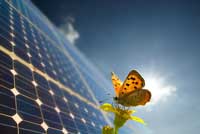
With
the potential depletion of oil resources becoming a reality, many feel
that it is time to look for alternative
energy sources. While there is a limited amount of oil
available, the power from the sun, wind, and other alternative energy
sources is practically limitless.
However, there are advantages and disadvantages to these alternative
energy options. Here is a quick review of the benefits and drawbacks
associated with a few of these sources, including solar power, wind
power, and biofuels.
Solar Power
In truth, many fossil and renewable energy sources ultimately come from
solar energy. For all intents and purposes, this article refers to solar
power as energy that is directly collected from the sun.
Advantages:
•Zero emissions of air pollutants and greenhouse gases
•Easy to install
•Virtually no energy costs once installed
•The technology for solar power is constantly improving
•Sunlight is widely available
Disadvantages:
•Solar radiation may only be collected during the daytime
•Such things as weather, location, and seasons may affect sunlight
availability
•Solar technology is still too costly for most people
•A lot of surface area is currently required for strong power,
which means many, space-taking installations are needed
Wind Power
This alternative energy resource makes use of wind turbines for the
conversion of wind energy.
Advantages:
•No emissions, hence no greenhouse gas contributions
•Though tall, wind turbines only require a small plot of land
•The cost per watt is among the lowest of current energy options
•Their ideal locations tend to be on farms and ranches, which
is a benefit to rural economies
Disadvantages:
•Intermittency (a backup power source is often required)
•Currently, wind technology requires a higher initial investment
than fossil fuel generators
•The best sites for wind generation tend to be located far from
cities, where the electricity is most needed
•Some feel they are unsightly and ruin the scenery of many ideal
locations
•Noise pollution
Biofuel
Biofuel is any type of fuel that comes from biomass (e.g. living organisms
or manure.) Energy is usually obtained from biofuel through combustion.
Advantages:
•Under the right conditions, biofuel is indeed renewable
•Lower emissions when used in automobiles
•Biofuel, in its natural gas form (biogas,) can easily be distributed
to the mass market through the already existing gas grid
Disadvantages:
•There are many preparatory steps required before biofuel is useable
(e.g. being grown, collected, dried, fermented, and burned)
•Resources must be used to complete each of these steps
•The gathering and use of wood (a biofuel) has lead to erosion
in some places
•It may require more energy to produce ethanol from corn than
will be gained in the production (corn is what the United States uses
for ethanol production)
•When food material is used for fuel, it necessitates the competition
between man and machine’s respective nutritional needs.
Although more drawbacks than benefits were listed in this article,
they are often outweighed. In addition to that, many of the shortcomings
related to alternative energy sources will likely be overcome as technology
advances with time. Currently, the disadvantages of fossil fuels are
being experienced firsthand.
In addition to these alternative energy sources, recycling is something
we all can do to contribute to the health and preservation of our environment.
Re-using natural resources over and over after they have been extracted
from the earth protects the dwindling supply of natural resources. Processes
used to make consumer goods from recycled material instead of raw resources
are much more energy and water efficient and much less toxic.








